|
|
|
Sort Order |
|
|
|
Items / Page
|
|
|
|
|
|
|
| Srl | Item |
| 1 |
ID:
127684
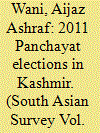

|
|
|
|
|
| Publication |
2011.
|
| Summary/Abstract |
A working democratic set-up provides ample space to mitigate the tensions in a society to a large extent. Unfortunately, democracy could not work in Jammu and Kashmir the way it is expected to work in a free society. Denial of democracy and misgovernance became almost an accepted way of political life in the state, which became one of the main reasons of the rise of militancy in the state. The 2011 panchayat elections provide the best opportunity to restore the confidence of the people in the democratic set-up by empowering the elected representatives in a real sense and bringing more and more people into the democratic setup. It also poses a great challenge to the government as far as fulfilling the democratic aspirations of the common people who have whole heartedly participated in this democratic exercise at the local level.
|
|
|
|
|
|
|
|
|
|
|
|
|
|
|
|
| 2 |
ID:
127681
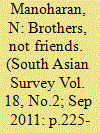

|
|
|
|
|
| Publication |
2011.
|
| Summary/Abstract |
Mahatma Gandhi referred to Sri Lanka as India's 'daughter state'. True to this metaphoric observation, relations between the two countries have been by-and-large cordial, but occasionally not devoid of irritants. India is Sri Lanka's closest, most important and powerful neighbour. Relations between the two neighbours stretch to more than two millennia in wide-ranging areas-political, economic, socio-cultural and military. Common colonial experience under Britain led both countries to have similar world views, yet certain strategic imperatives and national interests dictated differing policies, at times conflicting with each other. India has always stood by Sri Lanka and time-and-again reiterated its unambiguous support to safeguarding the latter's unity, territorial integrity and sovereignty. Despite witnessing various ups and downs, the bilateral ties between the two countries have never been bad to a level of confrontation. They have in fact matured over a period of time and, in the present context, serve as a model of good neighbourly interaction.
|
|
|
|
|
|
|
|
|
|
|
|
|
|
|
|
| 3 |
ID:
127685
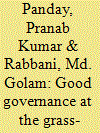

|
|
|
|
|
| Publication |
2011.
|
| Summary/Abstract |
Considering the importance of good governance, the article explores the governance situation of the lowest local government tier (Union Parishad) in Bangladesh. Through the application of four good governance indicators-leadership, people's participation, transparency and accountability and equity-the expectation is that the findings would add a new dimension to the existing knowledge of local governance. Based on empirical data collected from the field, the study findings suggest that the governance situation at the local level is not conducive for the establishment of good governance and strong local democracy in the country. Despite incorporation of different provisions (ward shava, open budget, citizen charter and right to information) in the Local Government (Union Parishad) Act of 2009, the government has failed to ensure participation, accountability, good governance and transparency. Against this backdrop, the governance of local government bodies has been characterised by reluctance of local government leaders in ensuring development, lack of people's participation, transparency and accountability and unequal distribution of services.
|
|
|
|
|
|
|
|
|
|
|
|
|
|
|
|
| 4 |
ID:
127680
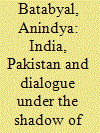

|
|
|
|
|
| Publication |
2011.
|
| Summary/Abstract |
In the wake of the 11 September 2001 terrorist attacks in the US and the subsequent war on terror, the Afghanistan-Pakistan region has emerged as a safe sanctuary for various terror groups like Al-Qaeda, Taliban and Lashkar-e-Taiba. This article focuses upon the close linkages between the legacy of the anti-Soviet jihad inside Afghanistan in the 1980s and the insurgency that later began in the Indian-administered part of Jammu and Kashmir, which from its inception has been aided and abetted by the Pakistan army and its Inter-Service Intelligence Directorate (ISI). Despite international pressure, the infrastructure of terrorism directed against India from Pakistan-controlled territory remains intact due to inaction of the Pakistan government for political and strategic reasons. So long as the symbiotic relationship between sections of the Pakistan government (particularly the army and the ISI) and the various anti-India terrorist groups remains intact, there will be no meaningful progress in any kind of bilateral dialogue between the estranged neighbours.
|
|
|
|
|
|
|
|
|
|
|
|
|
|
|
|
| 5 |
ID:
127682
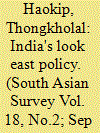

|
|
|
|
|
| Publication |
2011.
|
| Summary/Abstract |
The Look East policy has emerged as an important foreign policy initiative of India in the post-Cold War period. It was launched in 1991 by the Narasimha Rao government with the aim of developing political contacts, increasing economic integration and forging security cooperation with countries of Southeast Asia. The policy marked a shift in India's perspective of the world, with the strategic and economic importance of Southeast Asia to India's national interests being recognised. The second phase, which began in 2003, extends the coverage of the Look East policy from Australia to East Asia, with Association of Southeast Asian Nations (ASEAN) as its core. The new phase thus marks a shift in focus from trade to wider economic and security cooperation, political partnerships, physical connectivity through road and rail links. In this article, the evolution of India's Look East policy and its recent approach are analysed.
|
|
|
|
|
|
|
|
|
|
|
|
|
|
|
|
| 6 |
ID:
127683


|
|
|
|
|
| Publication |
2011.
|
| Summary/Abstract |
The Armed Forces (Jammu & Kashmir) Special Powers Act (AFSPA) has been in force since the last two decades without a lull in between. More than anything else, it has facilitated violations of human rights on account of several of its draconian provisions. Though originally meant for a limited period, AFSPA has become a permanent feature now. The reports of torture, custodial killings, rapes, forced disappearances, fake encounters continuously pour from the state. Moreover, there is a virtual military rule in the state with 500,000 armed troops (300,000 army troops, 70,000 Rashtriya Rifle soldiers, 130,000 central police forces) to control the people and over 100,000 civilian intelligence and surveillance operatives to monitor them. The AFSPA has emboldened these forces to use excessive force to suppress popular aspiration in order to maintain 'calm' which has resulted in the death of thousands of innocent people. This article argues that this situation is untenable in view of the oft-claimed democratic credentials of India and hence argues for AFSPA's annulment.
|
|
|
|
|
|
|
|
|
|
|
|
|
|
|
|
| 7 |
ID:
127686
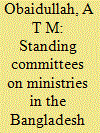

|
|
|
|
|
| Publication |
2011.
|
| Summary/Abstract |
Since parliamentary democracy in Bangladesh was restored in 1991, the reorganisation of parliament has become the centre of attention. Development partners have been keen on organisational and institutional reforms in parliament to make a meaningful shift to the parliamentary system that was put in place abruptly and without adequate preparations. This transformation called for a revision of rules and the modernisation of the parliamentary secretariat, rejuvenating the committee system. This article highlights the major steps taken in the reorganisation of the standing committees of the parliament in Bangladesh, in an attempt to increase the parliament's institutional/oversight capacity on the executive. It traces the weaknesses of the parliamentary standing committees of the early 1990s, findings and recommendations of the major reform measures and the state of affairs in the aftermath of reforms. However, strengthening parliamentary committees and their oversight capacity on the executive needs systemic and institutional changes, which calls for strong political commitment and strategic leadership on the part of senior parliament management and change in the mindset of the executive.
|
|
|
|
|
|
|
|
|
|
|
|
|
|
|
|
| 8 |
ID:
127679


|
|
|
|
|
| Publication |
2011.
|
| Summary/Abstract |
Women as a social group are vulnerable to food insecurity despite being primary actors in the food chain. The problem is especially rampant in parts of South Asia and Southeast Asia. The drivers of this vulnerability range from economic to social, cultural, legal and psychological factors. Vulnerability to food insecurity has a definite effect on the health of women and children, as well as social and economic impacts in terms of fewer opportunities for education and greater instances of early marriages. A comparison of indicators used to assess vulnerabilities of women in the two regions shows that the overall situation in South Asia is worse than that in Southeast Asia. There is also a conspicuous difference in terms of the relative weight of the drivers behind this vulnerability. The primary securitising actors at the national, regional and international levels have to play an individual and collective role in rectifying the situation. It is equally mandatory for regional groupings such as the Association of Southeast Asian Nations (ASEAN) and South Asian Association for Regional Cooperation (SAARC) to provide a sound systemic environment for individual countries to work towards achieving these objectives.
|
|
|
|
|
|
|
|
|
|
|
|
|
|
|
|
|
|
|
|
|